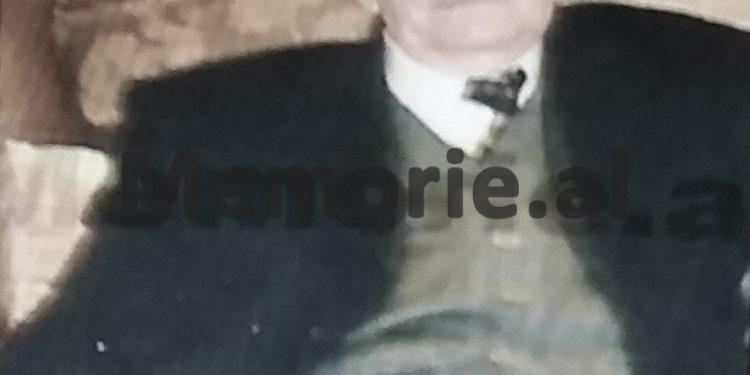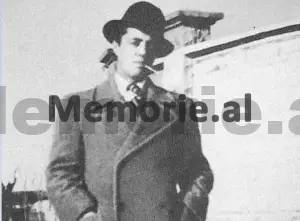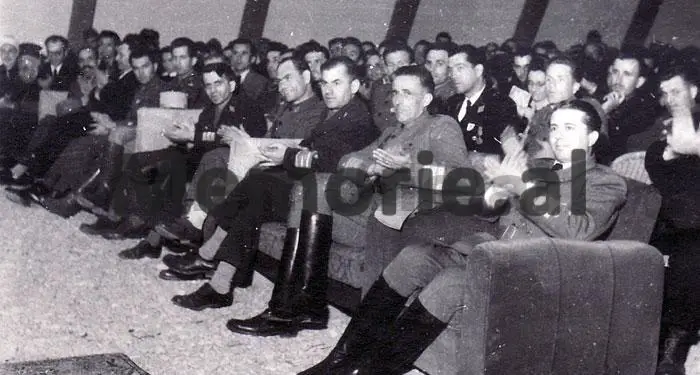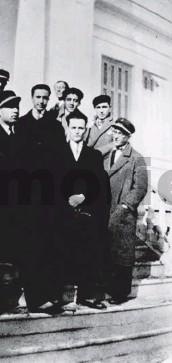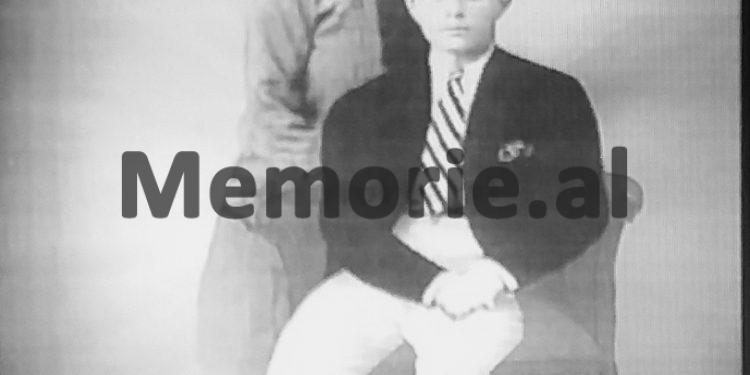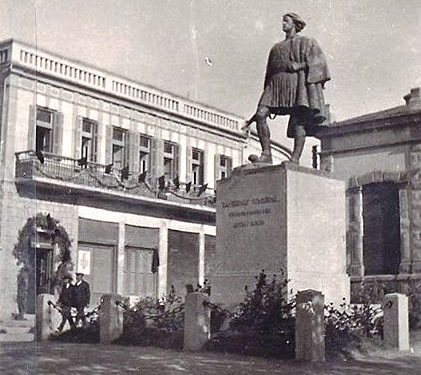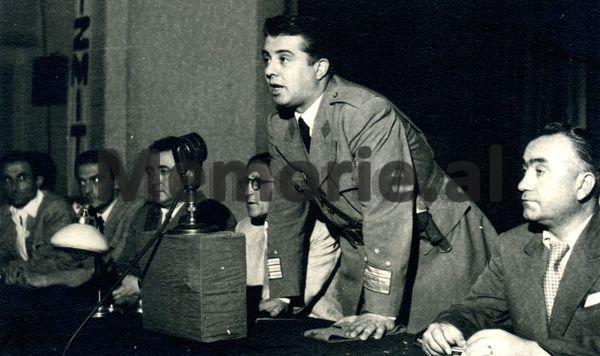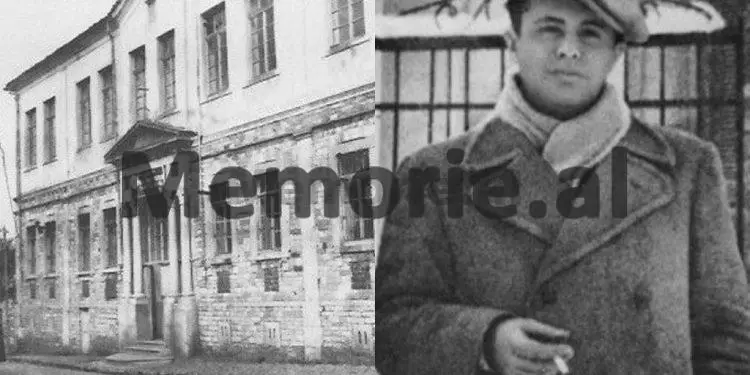Dashnor Kaloçi
Memorie.al publishes the archival document dated June 5, 1945, where Enver Hoxha orders the execution of his former close friend since childhood in Gjirokastra, with whom as a peer, he had been a roommate for several years in the dormitory of the French Lyceum of Korca …?!
It was the distant June 5, 1945, when an urgent radiogram signed by Colonel-General Enver Hoxha, in the capacity of Commander-in-Chief of the National Liberation Army, approved the death sentence of six people, tried by a Military Judicial Council of Division III, of the Second Corps, headed by the Chairman, Irakli Bozo (major) and prosecutor, Ziqiri Mero, first captain. While five of them were military, former partisans of the First Assault Brigade, the sixth person on the list approved by Enver Hoxha to be executed was a civilian, and his name was Fahredin Angoni.
He was originally from Gjirokastra and a descendant of one of the most famous families of that stone city with ancient history. Even in his childhood, he had been in a neighborhood with Enver Hoxha and his close friend. The case brought him to continue his friendship with Enver for many more years in the city of Korça, where they were co-students at the French Lyceum of that city. They even slept in a dorm room, or rather; Fahredin received Enver in his room, where their fellow citizen, Gjirokastra, Selaudin Kokona, who came from one of the most famous families of that city, was also present. While Enver did not excel in lessons, Fahredini was one of the best high school students not only in lessons but also in behavior and as an intellectual formation.
He was fluent in several foreign languages, such as; French, German, English, Italian, Latin and Greek. This is made known, among other things, by the books that Fahredini translated in those years, such as “The Barber of Seville”, (of Boumarshe), “The Genius Boy” (Mozart), “Faust” of Goethe, etc. In addition to these translations of masterpieces of world literature, based on his nationalist views, Fahredin Angoni in 1929-1930, wrote the novel “Skenderi and Olympia” which deals with the massacres of Greek andartes in the village of Hormova in Tepelena.
All this creativity belongs to the period when Fahredini was a student at the French Lyceum in Korça, where Enver Hoxha did not write a single line. And after graduating from that high school, the roads of Fahredin Angoni and his friend, Enver, were finally parted?! And they never met again. Ironically, Enver, who did not excel in his studies, received a state scholarship and went to study in France, while Fahredin Angoni, one of the best students of the French Lyceum, was appointed a teacher in the most remote villages of the Korça region.
As it is known, Enver could not continue his studies for more than six months at the University of Montpelije, as he could not pass any exam, and the then Minister of Education, Mirash Ivanaj, cut his scholarship. And so, he was forced to after some time (after working a short time at the Albanian consulate in Brussels), to return to Korça, where he taught French as a foreigner at the Lyceum where he had been a student. As Enver became a communist, Fahredin was a nationalist with deep anti-communist convictions. Thus, he joined and joined the nationalist forces of the Balli Kombëtar organization, being one of the main leaders of that nationalist organization for the Korça Region, where he covered the youth. Likewise, while Fahredini had started a family (he married Praksithe Shahini and had three children: Lirika, Gjergji, Pirro), his friend, Enver, continued to be single.
The events unfolded in such a way that at the end of the war at the end of 1944, two former close friends from Gjirokastra, would see themselves at two ends, extremely opposite. Enver the first of Albania, while Fahredini a more ordinary man, engaged in trade in the city of Korça, to support his family. And the beginning of 1945 would be fatal for Fahredin Angoni, as he was arrested along with a large group of 30 people, some of whom had been in nationalist formations during the War, but most of them military and former partisans. Mehmet Shehu First Assault Brigade. Accused of agitation and propaganda among the army and inciting desertions, they were brought before a military court of the Third Division of the Second Corps, which was headed by Irakli Bozos, a schoolmate of Fahredin Angoni, who during the court hearings of improvised in the investigation cells of the Palacinas (Italian palaces in Korça), there were quite heated debates with his high school friend.
Fahredini declared in court that Balli Kombëtar was a nationalist organization and had an ideal and patriotic mission, but that unfortunately lost the war. This statement, made in a declamatory way, would cost him dearly, since out of the six death sentences, the President of the Court, Irakli Bozo, “saved” one for his friend from the French Lyceum, Fahredin….?! Which “did not spoil” and their other friend, Enver, Chairman of the Democratic Government of Albania and Commander-in-Chief of the Army, who by means of an urgent radiogram, dated June 5, 1945, approved the death sentence of Fahredin. Thus, ended the life of Fahredin Angoni, by two of his schoolmates, but especially by Enver, who was at the head of the state and calmly signed his execution.
But Fahredin would not be the only one of Enver’s former schoolmates who ended up in the lead…? He was the first to be executed, as after him the “turn” came to other comrades, such as; Enver Zazanit, Syrja Selfos, Abaz Omarit etc. While he ended up in severe imprisonment, many other schoolmates from Korça and France, such as; Dr. Isuf Hysenbegasi, Professor Foto Bala, agronomist Adem Beli, Dr. Hasan Jero, etc., to conclude with Koço Theodhos, the former Deputy Prime Minister who was executed in 1975. And for all of them, it was said…. that they had that “luck”, for the sole reason; that they knew a lot from the private life of Enver Hoxha…?!
Testimony of 90-year-old Avni Bejkova Xhomaqi, who was pardoned in that trial and sentenced to 25 years in political prison
“Fahredin Angoni’s debate with Irakli Bozon, the president of the court”
From that improvised trial that took place 75 years ago in “Pallacinat” of Korça, only one of the convicts remained as a witness, who was pardoned to death and reduced to life imprisonment and then to 25 years. A few years before he parted from this life, in age 90-year-old Avni Bejkova Xhomaqi, as if to testify before history, the ugly crimes of that regime that was laying the bloody foundations that with his coming to power, among other things, said: “While they started torturing me there in the investigative chamber, Myrteza Slleusha, unable to bear the pain was told that she would sign everything they would ask. After torturing me all night, the next morning I was taken to court, which took place behind closed doors. I refused to sign the indictment and at that moment the President of the Court, Irakli Bozo, ordered that I be interrogated again but not beaten. After that when I was sent back to the cell, I told everything to Fahredin Angon, who told me that I had finally escaped the shooting. From a scrap guard, I learned that in order to spare my life, Colonel Riza Kodheli and Emine Butka had intervened. That same night, we were all taken to court, which took place right there on the upper floors of the “Palaces”. That trial was quite formal, as our fate was predetermined when we were arrested and in two or three hours, all the detainees, who became 30 people, were put in the process. During that trial, President Irakli Bozo, among others, asked Professor Fahredin Angoni, saying: “Do you accept that the Youth of the National Front has betrayed?” And Angon replied, “No, she did not betray, but she failed in her mission.” The only thing that was confirmed in court was the fact that Zef Sadria and Lec Ndoci had told Angoni that they were waiting for the arrest, after they had been with the National Ball. And Angon had told them that it was better for them to flee to the mountains and join the forces of Dule Alarup, than to flee to Greece, becoming a great betrayal. The next morning, the complaint was read out by prosecutor Ziqiri Mero, where, in addition to me, who was sentenced to life imprisonment, all 14 others were sentenced to be shot. After that, Fahredin Angoni addressed Irakli Bozo, who had a classmate at the Lyceum of Korça, saying: “Irakli, why did you kill me?”. Irakli replied, “Hold on, man.” Angoni replied: “I am a man, you did not show yourself to be a man, because we were also classmates”. Irakliu did not say another word and took the bag under his armpit and went down the stairs, leaving from there. After the pardon of my life I was sent to Burrel Prison (where I suffered for 15 years), where one day a prisoner from Korça, Ali Barmashi, told me that he had been present when six friends of my cell had been shot; Fahredin Angoni, Myretza Satka, Faik Tartari, Zef Sadria, Gjon Cufi and Lec Ndoci. Ali had been a soldier in Zërraska, Pogradec, when the six of them were sent to where they were demonstratively shot, in front of all the soldiers and officers of that unit. Fahredin and his comrades had refused to be executed behind their backs, as was the law for those accused of high treason, and so they resisted until they were crushed by the firing squad. “Ali later told me that the prosecutor who had assisted in the execution had approached him, who fired his revolver at their heads, which were thrown upwards by the bullets.”
Nac-Çl Army. Albanian. Corps II Judicial Council.
decision:
On behalf of the Albanian people. Military Judicial Councils of Division III. Corps-Army II. Presided over by the President of the II Corps Court with Major President Irakli Bozo, and Member Officer Hysen Rusi and Officer Sabri Pilkati, present Secretary Qemal Ceka with the assistance of Prosecutor I Captain Ziqiri Mero.
Today, on 4/6/1945, gathered in the Courtroom to try the partisan defendants: 1) Faik Tartari, 2) Xhorxhi Nova, 3) Tef Nika, 4) Ndoc Pema, 5) Lec Ndreca, 6) Luigj Çamuku , 7) Luk Prela, 8) Filip Gaci, 9) Rexhep Demiri, 10) Zef Sadrija, 11) Alush Ahmeti, 12) Hysen Ramazani, 13) Kol Vata, 14) Cam Dedoshi, 15) Luigj Cepi, 16) Frano Zefi, 7) Gjon Cufi, as well as civilians: 1) Faredin Angoni, 2) Haki Bablluzha, 3) Avni Bejkova, 4) Myrteza Sleusha, 5) Zenel Qyteza, complicated by this desertion, who according to the accusations of the Prosecutor declare this decision:
The Military Judicial Council after hearing the apology of the above-mentioned defendants. After hearing the claim of the Prosecutor, he concluded: Partly the defendants were members of the treacherous organization of Balli as well as militias and gendarmes, and as such served the occupier until the liberation of Albania. They have to do with Syrja Zoto’s process with comrades who tried to organize a large-scale desertion by joining the ranks of the Greek Reaction Army. The Trial Panel during the trial found that in general these elements have been aware of their high treason and for this the exponents of desertion have made contact with the above-mentioned civilians, to find the most complete way and to strengthen connections with the Greek reaction as well as with some foreign criminals. In part the defendants allege their treacherous and criminal offense they intended to commit. Since the defendants are charged with guilt, they are provided for and punished by Article 17 and punished by Article No. 41 on the organization and functioning of the Military Courts. For these reasons the Trial Panel in part contradicts the claim of the Prosecutor,decided:
The criminal guilt of the above-mentioned defendants and based on article 18 paragraph “Gj” Punishment of the guilty: 1) Faik Tartari, 2) Lec Ndreca, 3) Gjon Cufi, 4) Zef Sadrija, 5) Myrteza Sleusha, 6) Faredin Angoni. With death and decline of military honor, loss of civil rights and sequestration of their movable and immovable property under the relevant law.
And 1) Avni Bejkova with life imprisonment, 2) Luigj Camuku with 30 years’ imprisonment, 3) Cam Dedoshi, Luigj Cepi, Tef Nika with 20 years’ imprisonment, 3) Rexhep Demiri, Haki Babllusha, Zenel Qyteza with 5 years’ imprisonment. While 1) Xhorxhi Nova, 2) Ndoc Pema, 3) Alush Ahmeti, 4) Hysen Ramazani 5) Frano Zef Lekaj, 6) Kol Vata, 7) Luk Prela, 8) Filip Goci, with serious remarks and degradation for those who are graded. All defendants who have been sentenced to imprisonment lose their civil rights at the same time as the sentence. This decision regarding the death penalty is sent to the Supreme Military Court for approval while for others it is final. At the same time, we order their release from prison.
The President
Irakli Bozo Hysen Rusi Sabri Pilkati
secretary
Qemal Ceka
Continues tomorrow
Memorie.al




